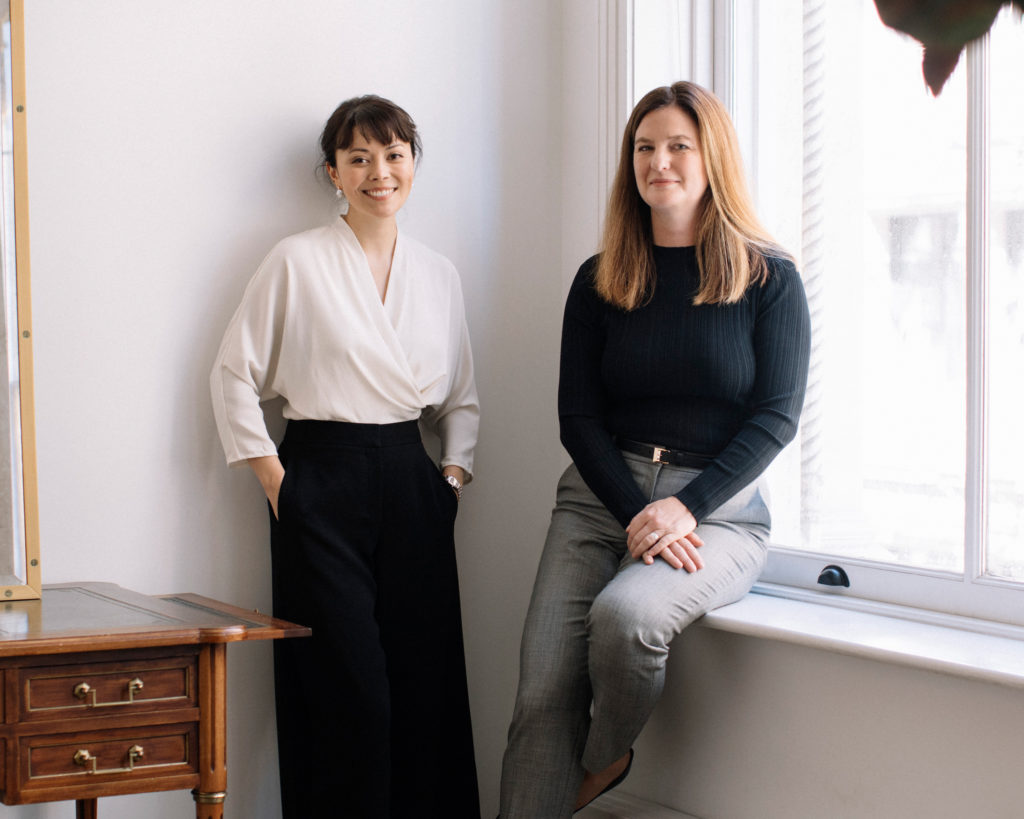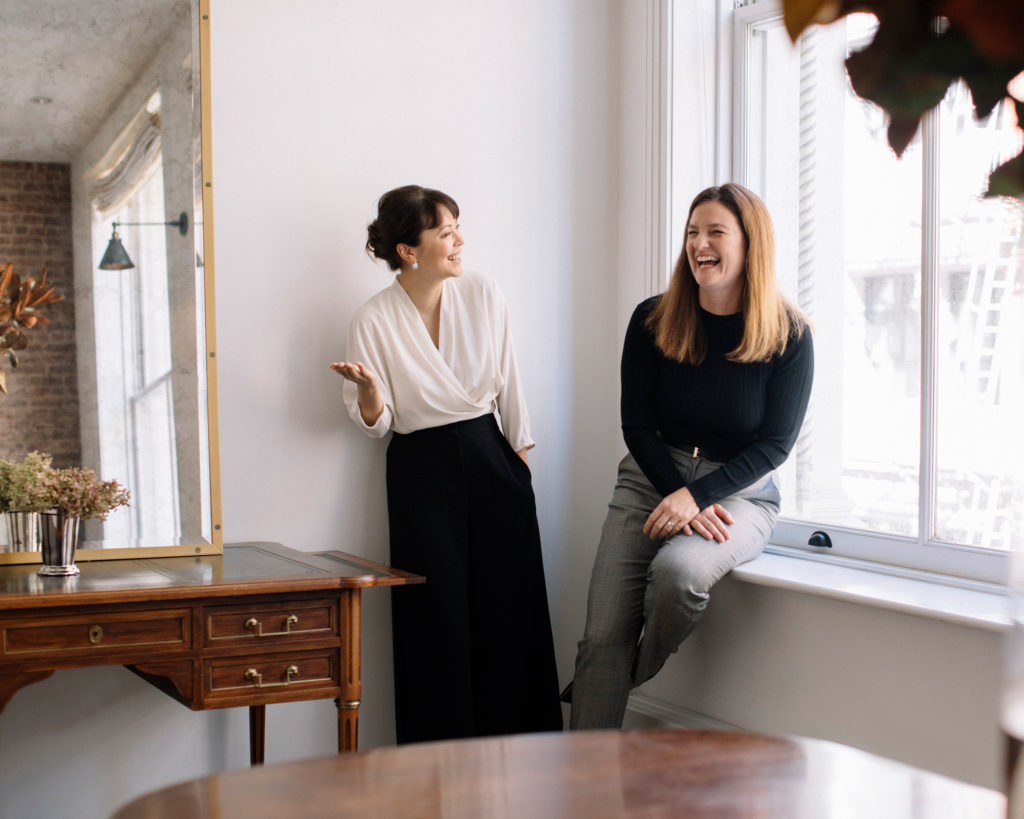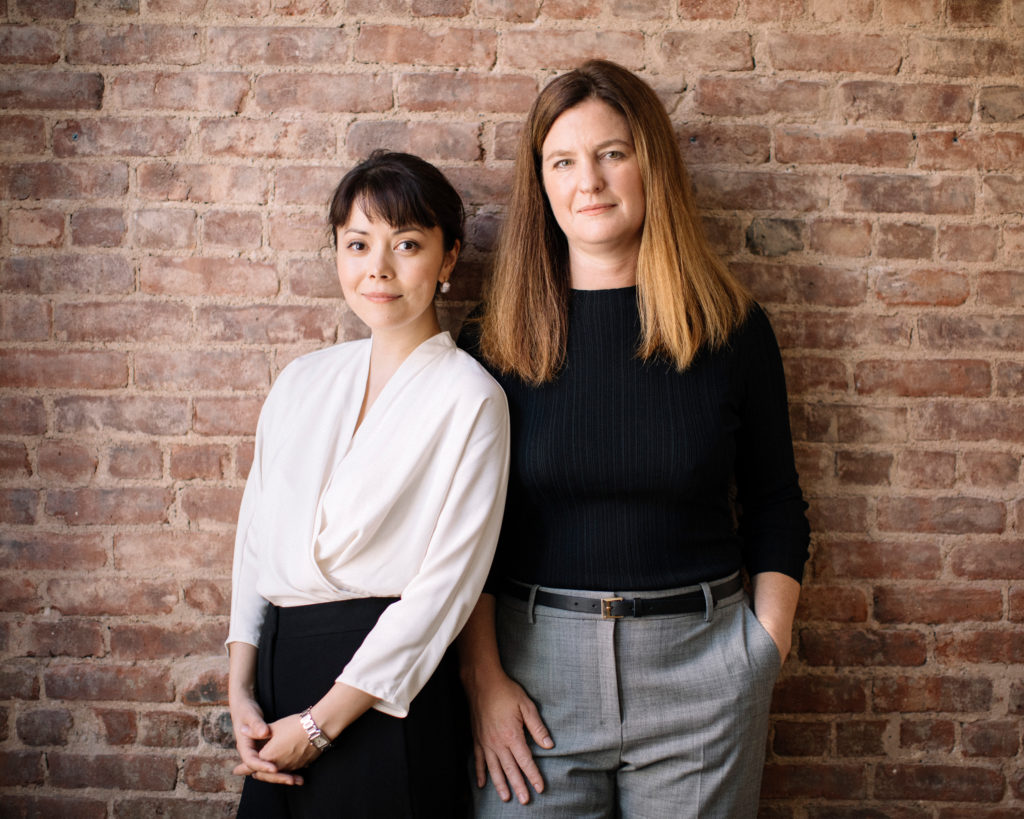Sarah LaFleur and Rebecca Sherer Get Real About Mentorship
October 25, 2019 | Filed in: Woman of the Week
If you find the concept of “mentorship” intimidating or confusing, you’re not alone. As women, we’re often led to believe that our careers can’t properly take off until we’ve locked down a stellar mentor to guide the way. But what does that even mean? What does healthy mentorship look like? How do you seek it out? And does everyone really need a mentor?
Want more M.M.? Sign up for our newsletter.
We sat down with M.M.LaFleur CEO Sarah LaFleur (age 35) and Rebecca Sherer (age 46), who directs Senior Executive Talent and Organizational Development at Google, to have a brutally honest conversation about how their relationship evolved and how mentorship should—or should not—factor into your career.

Sarah wears the Rivers top, the Zhou culotte, and the Capri earrings. Rebecca wears the Brodie top, the Mejia pant, and the Greenwich belt.
So, how did you two meet?
Sarah: We met 13 years ago when we both worked at Bain. I was a first-year analyst, and Rebecca was sort of the mother hen to all of us clueless 23-year-olds.
Rebecca: My role was in professional development and staffing, and I saw a new class of 35 analysts every year.
Sarah: I had a hard time at first. I made a couple of errors and had this total loss of confidence. One day a few months in, I went to your office and just started bawling. I was like, “I need to quit. This isn’t working out.” Total meltdown.
Rebecca: Luckily, I had a couch just for meltdowns. This was nothing new for me. I got you a bottle of water, because I had learned that people can’t cry when they drink water.
Sarah: And you were like, “Let’s not be dramatic. This is your first case, and it sounds like it’s just a poor fit. Let’s see if we can get you on a different case.” And you helped me understand that failure on one case—or even failure at Bain overall—didn’t translate to failure in life. That was such an important message. I was a terrible analyst though…
Rebecca: You weren’t terrible! You struggled in the beginning, but then you were just fine. You weren’t top of the pack, but you left an impression on me because you were different—in a good way—and you were kind. I didn’t necessarily think, “Sarah is going to be a future CEO,” but I did feel you were a kindred spirit who was going to do something interesting.
Sarah: Everybody in my class at Bain loved Rebecca and trusted her so much. Even at 23, although I didn’t have a ton of professional reference points, I could tell that Rebecca was just really amazing at her job. Everyone was drawn to her. But then she left, and we fell out of touch.
And how did you reunite?
Sarah: It was 10 years later. M.M.LaFleur was a few years old, and we were looking for a head of HR. I thought, “Who’s the best person I’ve ever met when it comes to working with people?” I immediately thought of Rebecca, so I looked her up on LinkedIn. I knew we couldn’t afford to hire her away from Google, but I sent her a message that said something like, “My dream is to eventually hire someone like you, but in the meantime, will you help me think through some of my current challenges?”
Rebecca: And you wrote, “You probably don’t remember me.” But of course I remembered you! And I had just heard about M.M.LaFleur for the first time from a friend who was an investment banker. So it was perfect timing.

Sarah wears the Rivers top, the Zhou culotte, and the Capri earrings. Rebecca wears the Brodie top, the Mejia pant, and the Greenwich belt.
So how did you become mentor-mentee?
Sarah: We never used those terms. At first, I was just looking for specific advice about HR. I didn’t expect or know how we would turn it into a sustainable, long-term relationship, because Rebecca lived in California, and I was in New York. Things were moving so quickly at M.M., I didn’t even know how I would keep Rebecca in the loop enough to get ongoing advice. But you were really great about just emailing me regularly to say, “What’s going on? Tell me what’s happening.” You knew how to ask the right questions and just jump in with helpful feedback.
Rebecca: I think I was excited about the relationship for two reasons. The first was kind of self-serving. I wanted to understand the startup world better, and this was a learning opportunity for me. But the other reason was purely Sarah. We had so much fun talking about business and the problems you were solving. So I came and had lunch with your executive team, and we really clicked. We brainstormed together, and I remember thinking, “I really want Sarah to succeed. The world needs more leaders like her.” And personally, I was excited because I knew I could learn a lot by working with this team. Plus, I love fashion, and it was fun. So it all just came together.
Sarah: Yeah, that was a turning point. We started talking about what an advisor agreement would look like.
Rebecca: You said to me, “I want to be fair. Do you want to be paid a fee?” But eventually we settled on equity.
Sarah: And clothes. Don’t forget the clothes.
Rebecca: And clothes! But I preferred equity over a fee, because I realized I wanted to have a dog in the race. I wanted to feel invested in the long-term success of the company.

Sarah wears the Rivers top, the Zhou culotte, and the Capri earrings. Rebecca wears the Brodie top, the Mejia pant, and the Greenwich belt.
What makes the relationship work?
Sarah: Sometimes I feel like my business problems are so vast and complicated. There’s so much context. Rebecca is remarkably good at just jumping in and saying, “You know what? I don’t need the whole context. I know enough to ask the right questions. From there, I can get enough of an understanding to give you feedback.” I’ve never experienced that before, but it’s so helpful.
Rebecca: Sometimes Sarah is like, “But how do they do this at Google?” And I say, “Who cares? You’re better than they are!” Sarah has a unique quality of being able to hold the business needs and the personnel needs at the same time. Not many leaders can thread the needle like that, so that’s exciting for me to see. I feel like I’m her fan, I’m her champion. But it’s not like we’re on the same professional path and I’m just 10 years ahead. I don’t necessarily have the answers; I’m here to advise.
Sarah: As I grow M.M.LaFleur, part of what I do is retail, but part of what I do is digital technology. And I actually find myself being one of the iterators in that space—part of a group of leaders who are trying to redefine the space. So there’s no one who can necessarily tell me what to do, but the reason my relationship with Rebecca is so special is that she gives me timeless advice that’s not industry-specific.
Rebecca: Because it couldn’t be.
Sarah: But you’re like my business therapist. She’ll coach me on how to have tough conversations with employees. She’ll be like, “Why don’t you start with an ‘I’ statement?” Like, “I felt XYZ when you did…” She helps me be assertive while still being human.
Rebecca: Sarah and I are both deeply empathetic people, so sometimes I just give her the advice I would give myself.
So does every woman need a mentor ASAP in order to succeed at work?
Sarah: No. I actually don’t subscribe to the philosophy that everyone needs a mentor.
Rebecca: Same. These aren’t simple times, and people’s career paths are not as straightforward as they used to be. It’s unlikely you’re going to have one single mentor who can guide you all the way through, and sometimes I worry that women seek mentoring rather than building an active network of champions. You need multiple people who hold up mirrors for you, but someone’s mirror might only matter in one aspect of your life. Like, I have advisors who I trust to be my business mirrors, but not all of them understand what my definition of success is when it comes to my personal life or my family life. So I listen, and I take their opinions into account, but then I assess what matters most to me. I think it’s great to consult a variety of viewpoints, but you have to use your own internal compass to sort through them and make your own choices.
Sarah: Right. You need to be discerning about who you listen to, because bad advice from the wrong person is dangerous. For instance, I don’t like the idea of ‘tough love.’ When you’re seeking advice, you’re already putting yourself in a vulnerable position, so you want to feel like the other person is in your corner. If a mentor tried to give me tough love, it would shut me down really quickly.
Rebecca: Right. Because there are people who will say they’re giving you tough love, but what they’re really giving is their opinion. That’s different from thoughtfully advising someone. Advising means you’ve listened and integrated what the other person is trying to accomplish, so your advice is in service of helping them achieve that goal.

Sarah wears the Rivers top, the Zhou culotte, and the Capri earrings. Rebecca wears the Brodie top, the Mejia pant, and the Greenwich belt.
So, it sounds like we all need multiple mentors throughout our career?
Sarah: Yes, you need 3.7 at any given time.
Rebecca: Oh, I thought it was 2.2? But no, it’s true, I have lots of mentors in my network who I turn to for different things—and I also shed them! I had mentors at Bain who were incredibly valuable for me then. I still respect and care about them, but I don’t seek their counsel anymore because it wouldn’t be particularly relevant now. These relationships don’t need to last forever. You don’t have to engrave “thank you for your mentorship” on your gravestone.
Sarah: I’d say most mentor-mentee interactions are casual and short-term. I’ve never actually said to anyone, “Will you be my mentor?”
Rebecca: Right. It usually happens more naturally. But there’s no exact number of mentors or type of mentor. There’s no silver mentorship bullet. They come and they go; they ebb and they flow. Now I’m speaking in haiku…
But let’s say you don’t have a wide network, or you come from a minority background and you’re blazing a trail within your professional environment. Where do you even start?
Rebecca: Being a trailblazer is incredibly hard, and we shouldn’t underestimate the energetic burden that many people bear in the workplace because of their gender, sexuality, ethnicity, or class background. When you’re in this position, you absolutely need support, and I do think there are so many women who are excited to champion minorities. Sometimes you have to be proactive to seek them out, but they are there. You may not find someone who can hold your hand at every stage, but even if you find someone who will give you two golden tips a week, that’s a great start. Or maybe you just need someone who will hear you out and be with you in that experience. Think of them as little river guides who can help direct you incrementally—left turn, right turn—and help you feel seen and heard.
Sarah: Saying “will you be my mentor?” is awkward, but there’s never any harm in asking someone for 30 minutes of their time. It’s always worth attempting. The worst that can happen is they’ll say “no.”
Rebecca: And that person who says “no” is the exception. In my experience, people want to engage and help. It doesn’t mean they’ll be your lifelong mentor, but they may give a great tip that you wouldn’t have otherwise gotten.
What does mentorship look like at its best?
Rebecca: It starts with internal work. You need to ask yourself, “What is my personal measuring stick for success?” What am I working towards in the bigger picture? If you’re not clear on that, you may be able to find champions who can help you get promoted into the next job, but do you actually know if you want that job? You need to identify what you value, and then find mentors who can encourage you towards those goals. The more introspection you do, the more value you can derive from a mentor. There’s a woman who is my peer on paper, but I see her as a mentor. She constantly reminds me to think big, by saying: “Rebecca, what do you want two or three years from now? No, not just at Google—what do you want your life to look like?” I think for many women, we don’t always go there. We think, “Who am I to even want that or imagine that for myself?” So it’s important to have other women who can counter you and say, “If not you, who?” It’s so powerful to have someone who can hold you up to your higher purpose again and again—who won’t let you shrink back into a smaller version of yourself or a less evolved version of yourself.
Sarah: And they can teach you to do that for yourself. I think mentorship is wonderful if and when you can get it, but you can also be your own champion in many ways. You don’t need to panic if you don’t have a mentor at a given moment. It doesn’t mean you’ll fall behind.
Rebecca: Agreed. It’s kind of a fascinating note to end on: mentorship is super important, but overrated at the same time.
Photos by Rich Gilligan.
Styling by Nyjerah Cunningham.





